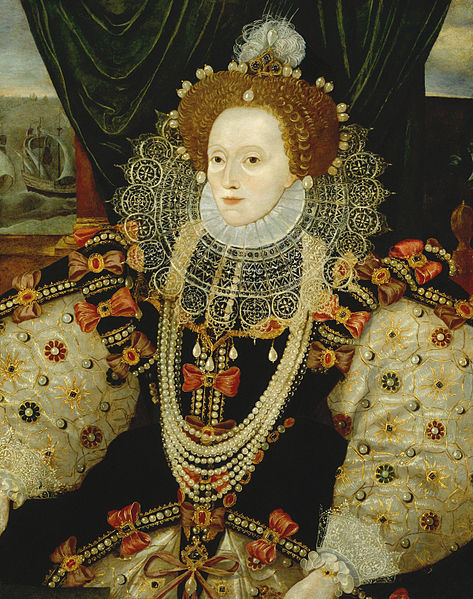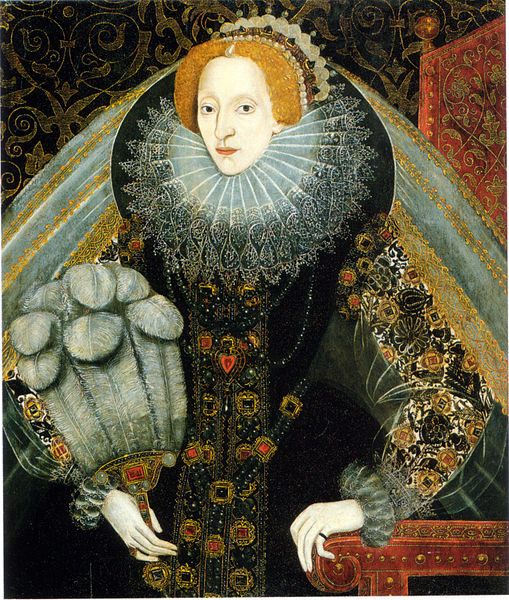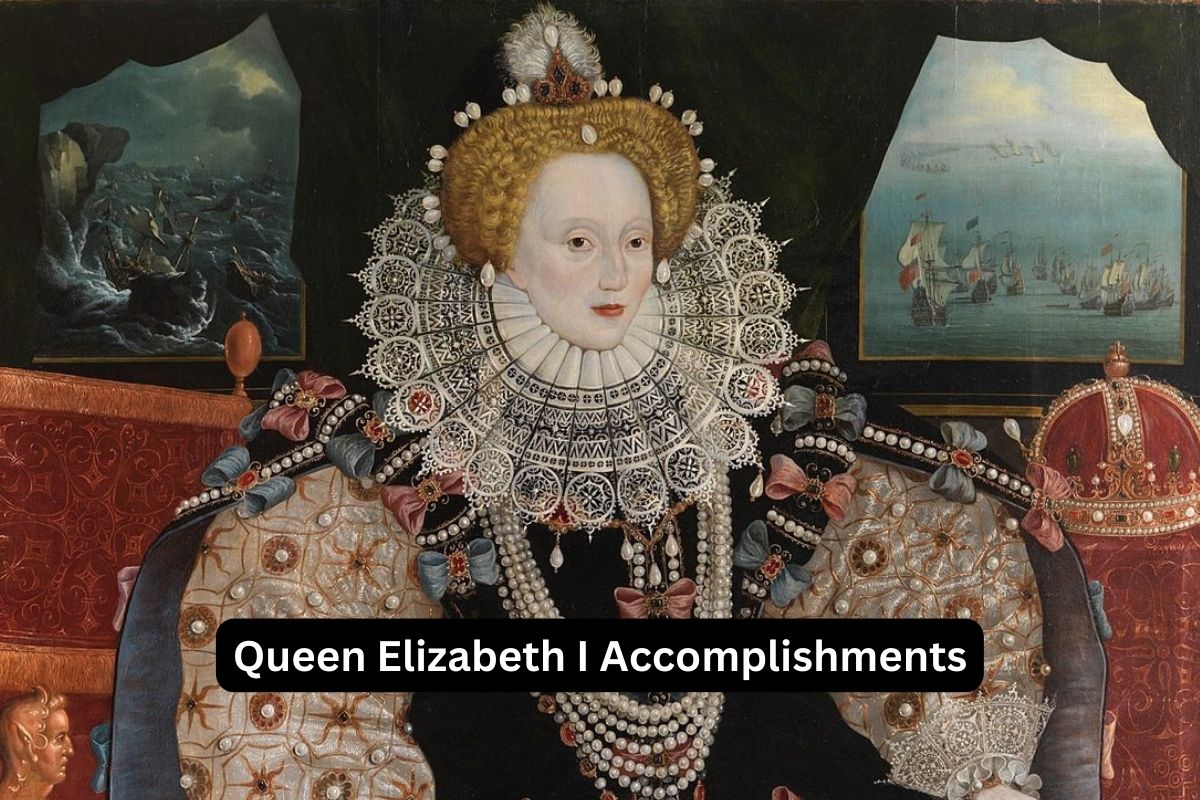Queen Elizabeth I, also known as the “Virgin Queen,” was born on September 7, 1533, to King Henry VIII and Anne Boleyn.
She ascended to the English throne in 1558 and ruled until her death in 1603. Elizabeth’s reign is often referred to as the Elizabethan Era, a period of cultural and economic flourishing.
She established the Church of England, defeated the Spanish Armada in 1588, and supported the arts, including renowned playwrights like William Shakespeare.
Queen Elizabeth I’s 45-year reign brought stability, prosperity, and a lasting legacy to England and the world, making her one of the most iconic monarchs in history.
She passed away on March 24, 1603, and was succeeded by James I, marking the end of the Tudor dynasty.
Accomplishments of Queen Elizabeth I
1. Establishment of Religious Stability
Queen Elizabeth I inherited a kingdom deeply divided by religious strife from her predecessors. Her predecessor, Queen Mary I, had tried to reintroduce Catholicism to England, leading to a period of religious persecution.
Elizabeth, however, was a moderate Protestant and sought to find a middle ground. She established the Church of England (Anglican Church), which combined elements of both Catholicism and Protestantism.
Also Read: Facts About Queen Elizabeth I
This religious settlement, known as the Elizabethan Religious Settlement, helped bring stability to the nation by allowing people to worship in their preferred way and ending the violent religious conflicts of previous years.

2. Defeat of the Spanish Armada
In 1588, Queen Elizabeth I faced a significant threat from the Spanish Armada, a massive fleet sent by King Philip II of Spain to invade England. Elizabeth’s leadership and her ability to rally her people were instrumental in repelling this formidable invasion force.
Also Read: Timeline of Queen Elizabeth 1
The English Navy, under the command of Sir Francis Drake and others, engaged the Spanish Armada in a series of naval battles, ultimately defeating it.
This victory not only ensured England’s independence but also marked a turning point in European history, weakening Spain’s dominance and enhancing England’s prestige
3. Promotion of English Renaissance
Queen Elizabeth I was a strong patron of the arts and culture. Her support for literature, drama, and the arts led to the flourishing of the English Renaissance.
During her reign, William Shakespeare, Christopher Marlowe, Ben Jonson, and other literary giants produced some of their most famous works.
The era is also known for its advancements in poetry, music, and visual arts. Elizabeth’s support for the arts helped establish a cultural legacy that continues to influence and inspire artists and thinkers to this day.
4. Economic Prosperity
Queen Elizabeth I’s reign was marked by economic growth and prosperity. Several factors contributed to this economic success. One significant factor was the expansion of trade, both domestically and internationally.
Elizabethan England developed thriving trade routes, including the establishment of the Muscovy Company for trade with Russia and the Levant Company for trade with the Ottoman Empire. This expansion of trade led to increased wealth and economic stability.
Additionally, exploration during her reign opened up new opportunities for trade and colonization. Explorers like Sir Walter Raleigh sought to establish colonies in the New World, contributing to England’s future colonial empire and access to valuable resources.
5. Stability and Security
Queen Elizabeth I brought a period of relative internal stability and security to England after years of turmoil and upheaval during the reigns of her predecessors.
She maintained a strong central government and effectively managed the power struggles within her court. By maintaining order and stability, she provided a sense of security for her subjects, which allowed for economic and cultural growth.

6. Diplomacy and Foreign Relations
Elizabeth was a skilled diplomat and managed complex relationships with foreign powers during her reign. She pursued a policy of cautious diplomacy, avoiding costly wars whenever possible.
Elizabeth’s diplomacy allowed England to navigate the intricate web of European politics and alliances. She formed alliances with Protestant nations, such as the Netherlands, and maintained a sometimes uneasy peace with Catholic powers like France and Spain.
Her ability to balance these relationships helped protect England from external threats and allowed the country to focus on its economic and cultural development.
Elizabeth’s diplomatic finesse was particularly evident in her handling of the Spanish Armada crisis, where her leadership and diplomatic skills played a crucial role in the English victory.
7. Encouragement of Education
Queen Elizabeth I was a strong advocate for education, and her reign saw efforts to promote learning. She recognized the importance of education for both men and women.
Elizabeth supported the education of young women in subjects such as mathematics, languages, and humanities, which was a relatively progressive stance for the time.
This encouragement of education contributed to the intellectual development of women in her realm and laid the groundwork for future advancements in female education.
8. Expansion of Navigation and Exploration
Elizabethan England witnessed significant advancements in navigation and exploration. Queen Elizabeth I sponsored and supported exploratory voyages, contributing to England’s emergence as a maritime power.
Sir Francis Drake, one of the most famous explorers of the era, circumnavigated the globe during her reign.
Explorers like Drake helped England establish trade routes, claim new territories, and lay the foundation for the future British Empire. The expansion of exploration during this period had a profound impact on global history.
9. Naval Expansion
Queen Elizabeth I oversaw the expansion and modernization of the English Navy. Recognizing the importance of a strong naval force for national security and trade, she invested in building and maintaining a powerful fleet.
This naval strength played a pivotal role in the defeat of the Spanish Armada and helped protect English interests both at home and abroad. The development of the English Navy under Elizabeth’s rule laid the groundwork for England’s future maritime dominance.
10. Longevity and Legacy
Queen Elizabeth I’s 45-year reign is one of the longest in English history and left a lasting legacy. Her rule is often referred to as the Elizabethan Era, a period marked by cultural achievements, economic growth, and relative stability.
Her leadership and ability to navigate the challenges of her time, including religious conflicts and foreign threats, earned her the title of the “Virgin Queen” and made her a symbol of national unity and strength.
Elizabeth’s legacy endures in the form of the enduring impact of the English Renaissance, the establishment of the Church of England, and her role in shaping the course of British and world history.
